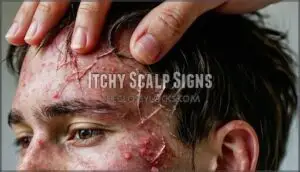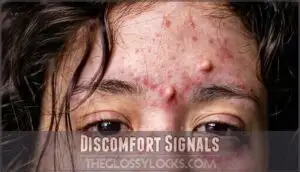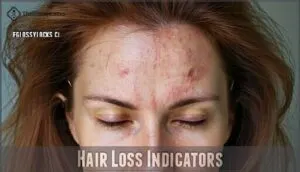This site is supported by our readers. We may earn a commission, at no cost to you, if you purchase through links.

Tea tree oil reduces inflammation while aloe vera soothes irritated skin, and coconut oil provides deep moisturizing benefits.
Apple cider vinegar rinses help restore your scalp’s natural pH balance, creating an environment that discourages further irritation.
These natural remedy for scalp inflammation options offer safer alternatives to harsh chemicals that might worsen existing sensitivity.
Start with patch testing any new ingredient to confirm compatibility with your skin type, and understand that the key lies in understanding which specific treatments target your particular inflammation triggers most effectively, using natural approaches that promote healing, and considering gentle methods to avoid further irritation, which can be achieved through deep moisturizing.
Table Of Contents
- Key Takeaways
- Causes Scalp Inflammation
- Symptoms Scalp Issues
- Natural Remedies
- Lifestyle Adjustments
- Soothing Scalp Treatments
- Frequently Asked Questions (FAQs)
- What is a natural anti-inflammatory for the scalp?
- What soothes an irritated scalp?
- How long does scalp inflammation take to heal?
- Can scalp inflammation cause permanent hair damage?
- Which foods should I avoid during treatment?
- Is scalp inflammation contagious to other people?
- When should I see a doctor immediately?
- Conclusion
Key Takeaways
- You’ll get the best results by combining gentle natural ingredients like tea tree oil, aloe vera, and coconut oil, which reduce inflammation without harsh chemicals that worsen sensitivity.
- Start with patch testing any new treatment to avoid adverse reactions, then focus on identifying your specific inflammation triggers for targeted relief.
- Consistency matters more than intensity when using natural remedies – apply treatments regularly over 2-4 weeks rather than expecting immediate results from aggressive approaches.
- Address lifestyle factors alongside topical treatments by reducing stress, improving your diet with anti-inflammatory foods, and maintaining clean scalp habits for comprehensive healing.
Causes Scalp Inflammation
Understanding what triggers scalp inflammation can help you prevent painful, itchy episodes that damage hair follicles.
Your daily hair routine, styling choices, and underlying health conditions often work together to create the perfect storm for scalp irritation.
Heat Styling Effects
Heat styling tools transform your hair routine but can turn your scalp into a battlefield.
Your styling tools shouldn’t become scalp weapons of mass destruction.
High temperatures from blow dryers, flat irons, and curling tools create heat damage that triggers scalp inflammation and irritation.
Here’s how heat styling affects your scalp:
- Heat damage occurs when temperatures exceed 300°F, causing scalp burns and tissue inflammation
- Product buildup from heat protectants clogs follicles, creating follicle stress and irritation
- Hair breakage increases when you combine heat with tight styling, pulling on sensitive scalp areas
- Scalp burns develop from direct contact with hot tools, leading to painful inflammation
- Follicle stress results from repeated heat exposure, weakening hair roots and causing tenderness
Chemical Treatment Risks
When you’re ready to change your look, chemical treatments can turn into your scalp’s worst nightmare.
Hair coloring, perming, and relaxer reactions expose your skin to harsh chemicals that strip away natural protective oils.
These styling products often contain ammonia, formaldehyde, and sodium hydroxide—ingredients that can trigger chemical burns and product sensitivity within minutes of application.
| Treatment Type | Common Risks |
|---|---|
| Hair Coloring | Allergic reactions, chemical burns, scalp blistering |
| Relaxer Reactions | Severe inflammation, permanent follicle damage, scarring |
| Perm Problems | Dryness, irritation, hair breakage at the root |
Your scalp doesn’t discriminate—even salon-grade products can cause coloring concerns that lead to weeks of discomfort and potential hair loss.
Hairstyle Tension
Your hairstyle choices can create mechanical stress on your scalp, leading to scalp inflammation and traction alopecia.
Tight ponytails, braids, and hair extensions pull constantly at follicles, causing follicle damage over time.
This mechanical stress triggers scalp sensitivity and inflammation, particularly around your hairline and temples where tension concentrates most.
- Tight braids and cornrows create constant pulling that weakens hair roots and inflames surrounding tissue
- Heavy hair extensions add weight that strains follicles and increases scalp inflammation risk
- High ponytails worn daily concentrate tension at specific points, creating localized follicle damage
- Sewn or glued hairpieces restrict natural scalp movement and trap moisture, promoting inflammation
- Frequent use of hair elastics creates pressure points that damage follicles and trigger scalp sensitivity
Health Condition Links
Autoimmune diseases like psoriasis create thick, scaly patches affecting over 2% of people, while alopecia areata causes patchy hair loss in 1.7% globally.
Skin infections from Staphylococcus aureus trigger scalp abscesses in 30% of cases, and fungal infections, especially in children, appear in 6% of scalp specimens.
Cancer risks, nerve disorders, and conditions like lupus can worsen scalp inflammation, requiring targeted antiinflammatory natural remedies and proper medical evaluation.
Symptoms Scalp Issues
You’ll recognize scalp inflammation through several telltale signs that shouldn’t be ignored. These symptoms often start subtle but can escalate into more serious hair and scalp problems if left untreated.
Itchy Scalp Signs
Your itchy scalp sends clear warning signals when scalp inflammation takes hold.
Your scalp whispers before it screams—listen to those early warning signals.
Persistent scratching becomes your body’s alarm bell, while flake severity ranges from light dusting to heavy snowfall on your shoulders.
Redness extent varies from small patches to widespread irritation across your entire scalp.
Hair breakage increases as you scratch inflamed areas, and sleep disturbance follows when nighttime itching won’t quit, leaving you tossing and turning instead of resting peacefully, due to the constant itching and resulting hair breakage.
Thinning Hair Patterns
You’ll notice specific thinning hair patterns that signal scalp inflammation’s impact on your follicles.
Receding hairline and crown thinning often appear first, while diffuse thinning spreads across your entire scalp.
Part widening becomes more noticeable as inflammation damages follicles systematically, and hair texture changes accompany these patterns, becoming finer and more fragile.
These natural scalp treatment indicators help identify when scalp inflammation remedy approaches are needed, and understanding these signs is crucial for applying the right scalp treatment.
Discomfort Signals
When your scalp starts sending warning signals, it’s telling you something’s wrong.
Early sensations often begin subtly, but Pain intensity can escalate quickly if left unchecked. Pay attention to these discomfort signals:
- Tingling sensations that feel like pins and needles across your scalp
- Burning feeling that intensifies when touching or brushing hair
- Sensitivity changes where normal touch becomes uncomfortable
These scalp sensitivity indicators often precede visible scalp redness or irritation, making them essential early warning signs of developing scalp inflammation.
Bacterial folliculitis, fungal ringworm, and head lice are common issues, so rule out infections early.
Hair Loss Indicators
A widening part or more scalp visibility can hint at hair loss.
If you’re seeing patchy hair loss or hairline recession, you might be facing follicle miniaturization from scalp inflammation.
Shedding vs. thinning matters—shedding’s sudden, thinning’s gradual, and watching for these indicators, especially scalp inflammation causes, is crucial.
Watch for these indicators, since catching them early helps with hair loss prevention and understanding the situation before things get out of hand.
Natural Remedies
When your scalp feels inflamed and tender, natural remedies can provide effective relief without harsh chemicals.
These evidence-based treatments work by reducing inflammation, balancing your scalp’s natural pH, and addressing underlying causes like fungal infections or irritation, utilizing natural remedies to achieve this balance.
Medicated Shampoos
Shampoo ingredients like ketoconazole and zinc pyrithione deliver prescription strength relief for scalp inflammation.
These medicated shampoos reduce fungal loads by 50-80%, targeting seborrheic dermatitis effectively.
Many users find relief using shampoo and should follow usage guidelines carefully—leave on scalp for 3-5 minutes before rinsing.
While side effects remain minimal, alternative brands offer gentler formulations for sensitive skin types, providing a prescription strength relief option.
Essential Oil Benefits
Harnessing essential oils can transform your scalp inflammation natural treatment approach.
These potent Oil Antimicrobials contain concentrated compounds that target inflammation while providing therapeutic relief for irritated scalp conditions.
- Lavender Soothing properties calm redness and reduce dandruff-related irritation through antifungal action
- Peppermint Cooling effects stimulate circulation while delivering anti-inflammatory relief to inflamed areas
- Rosemary Circulation enhancement promotes blood flow and provides powerful antiinflammatory scalp benefits
- Fennel Benefits include antimicrobial action that inhibits harmful bacteria growth and reduces inflammation
These scalp soothing remedies work best when diluted with carrier oils before application.
You can find lavender oil products online.
Dietary Deficiency Fixes
Your body’s nutritional foundation directly impacts scalp health.
Iron deficiency affects 60% of people with chronic scalp problems, while low zinc worsens seborrheic dermatitis.
Essential omega-3 fatty acids strengthen your skin barrier, and vitamin E protects against free radical damage.
B vitamins support overall scalp function.
| Nutrient | Food Sources | Scalp Benefits |
|---|---|---|
| Iron | Red meat, beans, fortified cereals | Reduces inflammation, prevents hair shedding |
| Zinc | Shellfish, nuts, eggs | Decreases itching, improves dermatitis symptoms |
| Omega-3s | Fatty fish, walnuts, flaxseed | Moisturizes scalp, reduces inflammatory markers |
| Vitamin D | Sunlight, fortified dairy, salmon | Alleviates scaling, supports barrier function |
Stress Reduction Techniques
Managing stress proves essential for healthy scalps since chronic stress worsens scalp inflammation and anxiety.
Mindfulness meditation reduces cortisol levels that trigger inflammatory responses. Daily yoga practice improves circulation while deep breathing exercises calm your nervous system.
Progressive relaxation techniques release physical tension affecting your scalp. Nature therapy provides natural stress relief, helping break the cycle between scalp inflammation stress and ongoing anxiety symptoms.
Incorporating broad spectrum SPF into your daily routine can also help mitigate stress-related skin issues, and improve overall scalp health by reducing chronic stress, scalp inflammation, and promoting healthy scalps with mindfulness meditation.
Lifestyle Adjustments
Making simple lifestyle changes can substantially reduce scalp inflammation and support your healing process.
Your daily habits, from what you eat to how you care for your hair, directly impact your scalp’s health and recovery speed.
Maintain Good Routine
Your daily scalp care routine forms the foundation for preventing scalp inflammation and maintaining healthy hair growth.
Consistency matters more than perfection when establishing habits that support scalp health. Building these practices into your morning or evening routine helps create lasting change for your scalp’s wellbeing.
- Gentle Cleansing: Wash hair 2-3 times weekly with sulfate-free shampoos to avoid stripping natural oils
- Regular Exfoliation: Use a soft-bristled brush or scalp scrub once weekly to remove dead skin cells
- Scalp Massage: Spend 5 minutes daily massaging your scalp to improve blood circulation and reduce tension
- Hydration Habits: Drink 8 glasses of water daily and apply lightweight oils to maintain scalp moisture
- Consistent Care: Follow the same routine timing and products to allow your scalp to adapt and heal
Increase Antioxidant Intake
Your body needs dietary antioxidants to reduce oxidative stress that triggers scalp inflammation.
Free radical damage worsens existing conditions, but nutrient absorption of vitamins C and E provides scalp protection.
Load up on berries, leafy greens, and nuts—they’re nature’s anti-inflammatory powerhouses.
Omega-3 fatty acids from salmon and walnuts also combat inflammation from within, supporting natural remedies through dietary changes.
Clean Scalp Habits
Through consistent regular cleansing, you’ll remove dirt and oil buildup that triggers scalp inflammation.
Gentle exfoliation twice weekly prevents product buildup from clogging follicles.
Clean brushes weekly to avoid reintroducing bacteria.
Scalp massage during washing boosts circulation while distributing natural oils.
These scalp health natural practices provide effective relief and prevention.
Low-Irritation Product Choices
Your scalp needs gentler products to prevent further irritation. Choose sulfate-free shampoos and hypoallergenic dyes that won’t strip natural oils.
Gentle conditioners with natural ingredients help restore moisture without harsh chemicals. Look for fragrance-free options specifically designed for sensitive scalp treatment.
These low-irritation products reduce scalp inflammation while maintaining effective cleansing and conditioning. To avoid irritation, consider a pH-balanced cleanser.
Soothing Scalp Treatments
When dealing with an inflamed scalp, you’ll find that natural treatments can provide significant relief while promoting healing.
These gentle remedies work by reducing inflammation, moisturizing dry skin, and addressing underlying causes without harsh chemicals that might worsen your condition, utilizing methods that are gentle.
Aloe Vera Gel Benefits
Aloe vera’s cooling properties make it nature’s gentle firefighter for your inflamed scalp.
This versatile gel delivers anti-inflammatory, antibacterial, and antifungal benefits that soothe irritation while preventing dandruff formation.
Five proven aloe vera scalp inflammation benefits:
- Reduces redness – Anti-inflammatory compounds calm visible irritation
- Moisturizes dry patches – Natural hydration restores scalp barrier function
- Fights bacterial infections – Antimicrobial properties prevent follicle damage
- Relieves itching sensation – Cooling effect provides immediate comfort
- Promotes healing – Vitamins and minerals accelerate tissue repair
For more options, explore various treatment products online.
Tea Tree Oil Effects
Tea tree oil’s potent antimicrobial properties target scalp bacteria and fungi that fuel inflammation.
Clinical studies show 5% tea tree oil shampoos reduce dandruff severity by 41% while providing anti-inflammatory action through terpinen-4-ol compounds.
Tea tree oil is also effective against malassezia fungus, a common cause of dandruff.
You’ll need proper dilution recommendations—never apply undiluted tea tree oil directly. Mix with carrier oils for safe application methods that deliver scalp irritation relief without causing sensitivity reactions.
Coconut Oil Moisturizing
Nature’s moisturizer works wonders for your inflamed scalp.
Coconut oil’s anti-inflammatory action reduces redness while its antimicrobial properties prevent infection.
You’ll find this scalp soother provides deep hydration, restoring your skin’s natural barrier.
Apply warm coconut oil directly to affected areas, massaging gently for maximum absorption.
These coconut benefits include improved circulation and lasting scalp inflammation relief, providing a natural solution with coconut oil.
Apple Cider Vinegar Rinses
Apple cider vinegar scalp rinses restore ideal scalp pH balance while delivering potent scalp inflammation relief.
Dilute ACV with water at a 1:4 ratio for safe application. Regular rinse frequency of twice weekly controls dandruff while adding natural hair shine.
For those with curly hair, ACV can enhance curl definition. This time-tested remedy offers gentle scalp inflammation remedies through antimicrobial properties that soothe irritation effectively, providing a natural solution for hair care.
Frequently Asked Questions (FAQs)
What is a natural anti-inflammatory for the scalp?
Coconut oil’s anti-inflammatory and antimicrobial properties provide excellent relief for inflamed scalps.
You can also try aloe vera gel, tea tree oil mixed with carrier oils, or turmeric-based treatments to soothe irritation naturally.
What soothes an irritated scalp?
Nearly one-third of women experience hair loss linked to scalp inflammation.
You’ll find relief using aloe vera gel, which soothes irritation with its anti-inflammatory properties.
Or tea tree oil mixed with coconut oil for antimicrobial benefits.
How long does scalp inflammation take to heal?
Scalp inflammation typically heals within 2-4 weeks with consistent treatment, though severe cases may take 6-8 weeks. You’ll notice improvement in itching and tenderness within days of starting proper care.
Can scalp inflammation cause permanent hair damage?
Yes, untreated scalp inflammation can cause permanent hair damage.
Chronic inflammation damages hair follicles, leading to scarring and irreversible hair loss.
You’ll want to address inflammation quickly to prevent long-term damage to your scalp, and reduce the risk of permanent damage.
Which foods should I avoid during treatment?
Maria noticed her scalp inflammation worsened after eating spicy foods and drinking coffee during treatment.
You’ll want to avoid inflammatory foods like processed sugar, refined grains, fried foods, and excessive caffeine, which can trigger flare-ups and slow healing, particularly due to excessive caffeine.
Is scalp inflammation contagious to other people?
Most scalp inflammation isn’t contagious, but certain conditions like fungal infections (ringworm), folliculitis from bacteria, or lice can spread through direct contact or shared items like combs and hats.
When should I see a doctor immediately?
While mild scalp irritation might feel like a minor inconvenience, severe symptoms demand immediate medical attention.
You’ll need urgent care if you’re experiencing pus, bleeding, open sores, fever, or spreading infection signs, which can indicate a serious condition requiring prompt medical attention.
Conclusion
Healing your scalp doesn’t have to feel like traversing a minefield of harsh chemicals.
These natural remedy for scalp inflammation approaches offer gentle yet effective solutions that work harmoniously with your body’s healing mechanisms.
You’ll find success by starting slowly, patch testing each treatment, and identifying which combinations address your specific triggers.
Remember that consistency matters more than intensity when using natural remedies, and your scalp’s recovery journey requires patience, but these evidence-based treatments provide sustainable relief without compromising your skin’s natural protective barrier.
- https://www.diviofficial.com/blogs/ingredients/tea-tree-oil-for-hair-and-scalp-health
- https://www.healthline.com/health/tea-tree-oil-for-dandruff
- https://www.webmd.com/skin-problems-and-treatments/what-to-know-about-tea-tree-shampoo-for-dandruff
- https://www.verywellhealth.com/tea-tree-oil-for-hair-8418641
- https://pubmed.ncbi.nlm.nih.gov/22473218/













